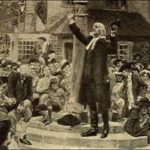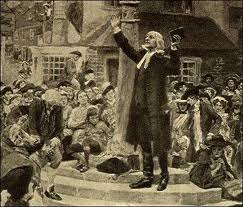London, England, 1991. I was an awkward 16 year old seated by myself in my history class at school. My awkwardness stemmed not only from the turbulence of adolescence. To add to my agonies I was a Christian, a desperately unpopular choice in my world. Even my kindest friends thought I was weird. I agreed; I went to a church where I was the youth group, and where the songs I sang sounded nothing like the Hip hop, pop and soul I enjoyed once I left the building. And like so many of the church buildings in my beautiful city, its size spoke of a former glory.
 My history class explored 18th and 19th Century English History exploring politics, social issues, and shifts in culture. That day I heard a familiar name in an unfamiliar setting, John Wesley. It was in my history class at school I learned of a Christian leader who dared to step outside the walls of his institution, and take the gospel to the streets. There we learned about his method of training leaders –“class meetings’ where the banker and the miner sat next to one another being accountable about their lives. We learned of a generation of lay preachers, determined to reach a broken nation with the Good News. We learned about the struggles and the harassment Wesley and his community experienced. Rejection, abuse, misunderstandings, hostility, tiredness and pain. But they carried on. We learned that the last letter he wrote was to a young abolitionist named William Wilberforce urging him to carry on fighting….Finally we learned that historians like Elie Halevy believed that England was more poised for revolution than countries like France, but was spared as a result of the Methodist revival. I was amazed that generations later, this story was still being told.
My history class explored 18th and 19th Century English History exploring politics, social issues, and shifts in culture. That day I heard a familiar name in an unfamiliar setting, John Wesley. It was in my history class at school I learned of a Christian leader who dared to step outside the walls of his institution, and take the gospel to the streets. There we learned about his method of training leaders –“class meetings’ where the banker and the miner sat next to one another being accountable about their lives. We learned of a generation of lay preachers, determined to reach a broken nation with the Good News. We learned about the struggles and the harassment Wesley and his community experienced. Rejection, abuse, misunderstandings, hostility, tiredness and pain. But they carried on. We learned that the last letter he wrote was to a young abolitionist named William Wilberforce urging him to carry on fighting….Finally we learned that historians like Elie Halevy believed that England was more poised for revolution than countries like France, but was spared as a result of the Methodist revival. I was amazed that generations later, this story was still being told.
I sat up straighter in my history class from that week on. I became bolder about my faith. I always knew that the gospel was real; Jesus had transformed my life. This was much bigger than my personal experience of God. Now I’d seen how the gospel would change the very fabric of Western society, I was inspired and wanted to be a part of it.
Years later, I’m still inspired, but I’m also sobered. It’s costly to move beyond the comforts of our status quo – even when the status quo is failing. It’s costly to see something fresh birthed from our churches. What is innovative and pioneering to us might be seen as disrespectful or threatening to others. There may be tensions, confusion, and rejection. It’s costly to invest future legacy in favor of current popularity. But our heart and communities carry a message of salvation that has transformed us and can transform our cities. We have been commissioned by a Savior whose love and power empowers us. So we press on, seeking fresh ways to share Jesus, not for the sake of something new, but for the sake of our communities, and for His glory.
Jo Saxton is a director at 3DM. She lives in Torrance, California.

